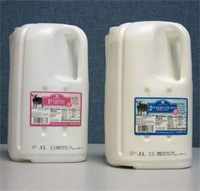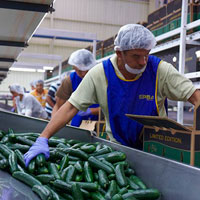Global Agriculture and Food
While many of our customers are working to stretch their budgets, we are working to do our part by giving them access to fresh food at affordable prices. One way we are able to do this is by purchasing more produce from local farmers and purchasing products that are grown and produced by people who use sustainable practices in their businesses. Our goal at Wal-Mart is to have a long-term supply of reliable agricultural and seafood products harvested in a sustainable way.
Americas
United States

In 2008, we launched even greater efforts to purchase locally grown produce in the U.S. With our locally grown initiative, we can provide high-quality, low-priced fruits and vegetables while supporting farmers and their local economies. By reducing the number of miles food travels between the farm and our shelves, we can decrease greenhouse gas emissions and conserve fuel.
In 2008, we began selling case-less milk at 236 Sam's Club locations in the U.S. The case-less milk jug is square in shape and virtually self-stacking, which eliminates the need for racks, extra transportation to pick up the racks and water required to clean the racks. Additionally, the case-less milk jug ships more efficiently, showing a 51 percent improvement in the cube utilization and allowing 9 percent more product on a truck.
We are also working with suppliers to offer more socially responsible products on our shelves. As a part of our first Earth Month in-store campaign in April 2008, we launched the sale of six coffees carried under our exclusive Sam's Choice brand that are either certified organic, Fair Trade Certified or Rainforest Alliance Certified. These coffees enable customers to get gourmet coffee at a great value while providing benefits to farmers, their communities and the environment. Sam's Club was one of the first retailers to offer Fair Trade Certified wine. And since November, Sam's Club members have been able to purchase Fair Trade Certified Malbec wine from Argentina in more than 400 Sam's Club facilities. A portion of the sales is collected by Transfair USA and used to build schools, medical facilities and other community projects.
We are committed to featuring more sustainably harvested seafood in our stores. Our efforts have included collaboration with the Marine Stewardship Council (MSC), Sustainable Fisheries Partnership (SFP), the World Wildlife Fund (WWF), Environmental Defense Fund (EDF), and the Alaskan salmon industry for wild-caught seafood and with the Global Aquaculture Alliance (GAA) for all farmed seafood.
Together, we are encouraging our seafood suppliers to implement plans that strengthen fishery management practices, rebuild stocks, reduce environmental impacts and encourage support for broader marine ecosystem management and protection efforts.
We made a commitment in 2006 to:
- Purchase all of our wild-caught fresh and frozen fish for the U.S. from Marine Stewardship Council (MSC)-certified fisheries by 2011.
- Work with Global Aquaculture Alliance (GAA) and Aquaculture Certification Council (ACC) to certify that all farmed shrimp suppliers to Walmart adhere to Best Aquaculture Practices (BAP) standards in the U.S. by 2011. These standards serve as a guideline to assist participants in performing environmental and social impact assessments of their production facilities and developing management systems for compliance with the certification standards.
As of January 31, 2009, in aggregate, 49 percent of the total pounds of fresh or frozen seafood sold at Walmart U.S. and Sam's Club have the MSC or ACC certification, with many more fisheries currently progressing through the certification process. We currently have 28 products in our stores that carry the MSC certification, with more selections under way. And 100 percent of the farmed shrimp products we purchase meet factory processing criteria established by the ACC, and we are in the process of having shrimp, catfish, tilapia and salmon farms become ACC-certified as well. Click here to learn more about our sustainably harvested seafood efforts.
Mexico
In 2008, Wal-Mart de Mexico sourced 99 percent of the fruit and vegetables sold in their stores from Mexican suppliers. They also feature more than 1,100 environmentally preferable products on their shelves.
Central America

Together with the global relief and development organization Mercy Corps and the United States Agency for International Development (USAID), we launched the Inclusive Market Alliance for Rural Entrepreneurs in Guatemala, which is focused on improving the lives of small-scale farmers. During a threeyear project, the Alliance will help small-scale farmers move from traditional crops, such as corn and beans, to growing demand-driven crops, such as tomatoes, peppers, potatoes and onions that will be sold to major retailers such as Wal-Mart. With the resources provided by the Alliance, we hope that small-scale farmers in these rural areas will be able to grow into entrepreneurial producers of premium products. We expect that higher, more consistent incomes will lead to increases in education, health and food security for their families and communities.
Brazil
Wal-Mart Brazil has committed to offering at least one organic product per food category. They currently have more than 1,000 organic items in stores from 172 organic product suppliers who provide meat, juices and fruits.
Puerto Rico
Our Puerto Rico market has launched a program called Siembra el Desarollo Del País (Sowing the Development for the Country) with the Banco de Desarollo Económico (BDE), the Puerto Rico Department of Agriculture and the non-profit organization Caborrojeños Pro Health and Environment. The program aims to identify and develop business opportunities for farmers, while providing customers greater access to local produce. By supporting this program, Puerto Rico reduces its dependency on imported produce. New agricultural entrepreneurs participating in the program will receive some financing from the Economic Development Bank to establish their business. They will also receive support from the Department of Agriculture on land preparation and crop seed availability. Additionally, participants will receive training sponsored by Wal-Mart to develop the skills needed to run agricultural-based businesses, strengthen new business projects and ensure that sustainable practices are being integrated into their farms. The products generated by participating businesses will be marketed under the brand name, "Del País" in Walmart supercenters, Sam's Club and Amigo Supermarkets. The project will start with 20 farmers and is expected to expand to 25 in 2009. During the first phase of the project, chili peppers, sweet potatoes, beans, yautía, yams, malanga and plantains will be produced.
Europe
United Kingdom
Our ASDA stores in the U.K. are working to put more locally grown and locally produced items on their shelves, as well. ASDA currently works with approximately 500 local food producers in the U.K. who provide more than 5,000 products to ASDA stores across the country. As an example, ASDA pledged that it will not sell any eggs sourced from abroad in its private-label egg brand. During the next three years, all ASDA brand eggs will be supplied by a group of local dedicated egg farmers. The private-label brand also guarantees all its hens have been vaccinated against salmonella. ASDA has also launched a campaign called "Respectful," which promotes free-range eggs exclusively supplied by a local supplier, Stonegate, and produced using humane, environmentally sound methods.
Asia
China
Wal-Mart China is working to bring customers better quality and sustainably-harvested produce through its Direct Farm Program. This program helps farmers in China place their sustainably grown produce in local Wal-Mart stores and receive better financial returns on their products. They aim to expand the Direct Farm Program to include as many as 1 million farmers by 2011.




